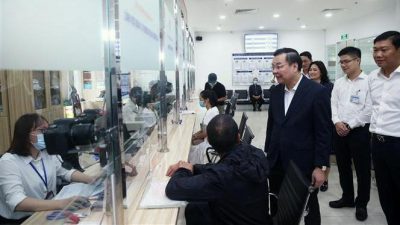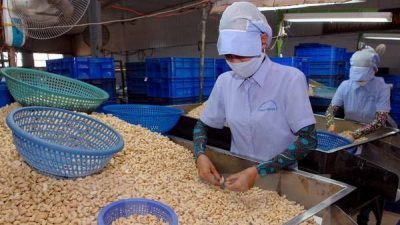
|
Over recent years, Vietnamese businesses and entrepreneurs have continuously grown and prospered, significantly contributing to the country’s economic development. |
|
However, in a context of deep international economic integration, Vietnamese entrepreneurs still face numerous difficulties. Therefore, it is essential to proactively develop strategies to gradually become a capable and qualified force that plays a key role in the development of the economy in general, as well as enhancing the capability for international economic integration. Businesses becoming the wings of the economy The Party and State has made numerous policies and guidelines to encourage the development of enterprises as well as promote the role of entrepreneurs in the cause of national construction and defence. As of today, Vietnam has over 800,000 enterprises and around 5.2 million business households with over five million entrepreneurs. The figure has proved that the pavement of the way for enterprises’ development was the right direction. Many Vietnamese entrepreneurs have been listed among the top global “US$ billionaires”. They hold big dreams and ambitions with aspirations of contributing to making the country more powerful, prosperous and civilised. In addition to the rapid increase in the number and scale of enterprises across all economic sectors, the Vietnamese entrepreneurial force has continuously developed, significantly contributing to the implementation of socio-economic development strategies, creation of jobs for employees, hunger eradication and the settlement of social welfare issues. Businesses have contributed over 60% to the country’s GDP, around 70% of state budget revenue and attracted millions of employees. Therefore, the promotion of the country’s economic development and improvement of Vietnam’s position on the world economic map could be considered a mission and responsibility of the entrepreneurial force and business community. According to President of the Vietnam Chamber of Commerce and Industry, Vu Tien Loc, in recent years, the Government has implemented many practical activities to promote the business environment, improve competitiveness and boost enterprise development. The dialogue between the Government and businesses has also been enhanced. The Government has listened to opinions, aspirations and proposals from the business community in order to improve the business environment as well as remove institutional bottlenecks and overlaps among legal documents. In the context of strong international integration, especially since Vietnam joined “big playgrounds” such as the Comprehensive and Progressive Agreement for Trans-Pacific Partnership (CPTPP) and the EU-Vietnam Free Trade Agreement (EVFTA), the role of the entrepreneurial force has increasingly shown their aspiration to strive to compete fairly with competitors and improve the country’s position, gradually becoming the wings that will help Vietnamese economy affirm itself in the international arena. Developing a strong entrepreneurial force Vietnam is facing great challenges in the context of deep international integration, placing a great responsibility on Vietnamese entrepreneurs and businesses. Chairman of the Board of Directors of DEOCA Group Ho Minh Hoang shared: “In order to enhance competitiveness and development in the current context, enterprises are determined to actively and frankly contribute their proposals to the State, aiming to create an appropriate investment environment in the future. In addition, they will expand their joint ventures and linkages and share their experience and responsibilities to create supply chains that will minimise cost and optimise production forces, identify weaknesses and limitations. Accordingly, the requirement for the current Vietnamese entrepreneurial force is the methodical improvement of management capacity, production and business activities towards sustainable development. There should be strong enterprises that are capable of creating a large value chain. Vietnam has now many potential units such as Viettel, Vingroup, Vietnam Airlines, Vinamilk, FPT, Thaco, and TH Group. They have been increasingly developed both in scale, competitiveness, products, services, governance, and technology. However, there have not been any Vietnamese businesses among the world’s top 500 largest enterprises. In addition, Vietnam’s private enterprises still had some weaknesses in terms of scale, technology, and labour productivity as well as lacking in cohesion causing the building of supply chains to be poorly implemented. Businesses’ responsibility and spirit of creative innovation have not been high enough. These are creating great challenges for both enterprises and entrepreneurs. Therefore, in the coming time, the Vietnamese entrepreneurial community should be determined to innovate and promote a more methodical and professional approach as well as upholding their social responsibility. It is crucial to focus on breakthrough factors in human resources and technology as well as outstanding products and brands. In the near future, a favourable social and legal environment will facilitate entrepreneurs to further promote their potential and strength, reaching out to the world. Source: Nhan Dan Online |

